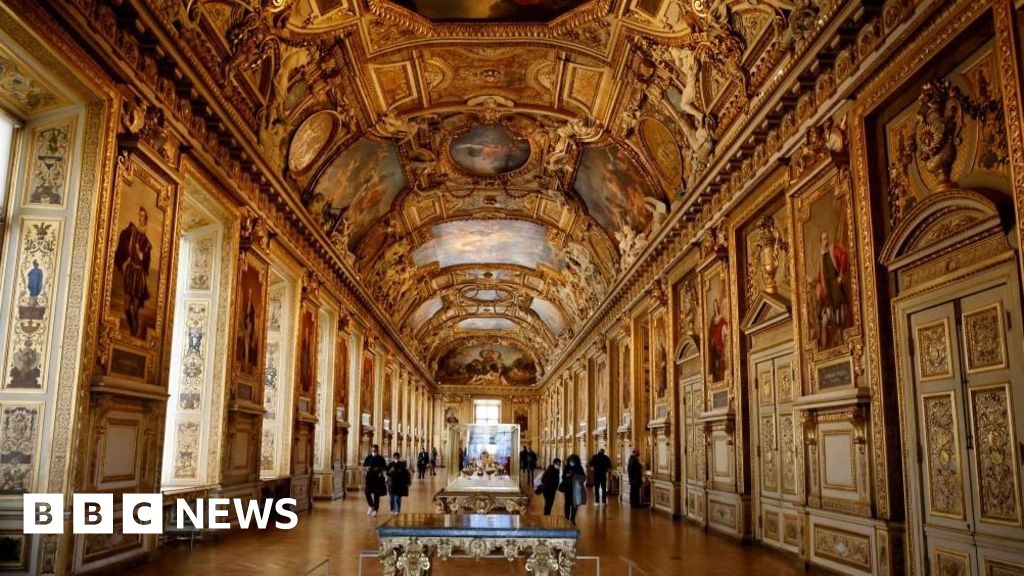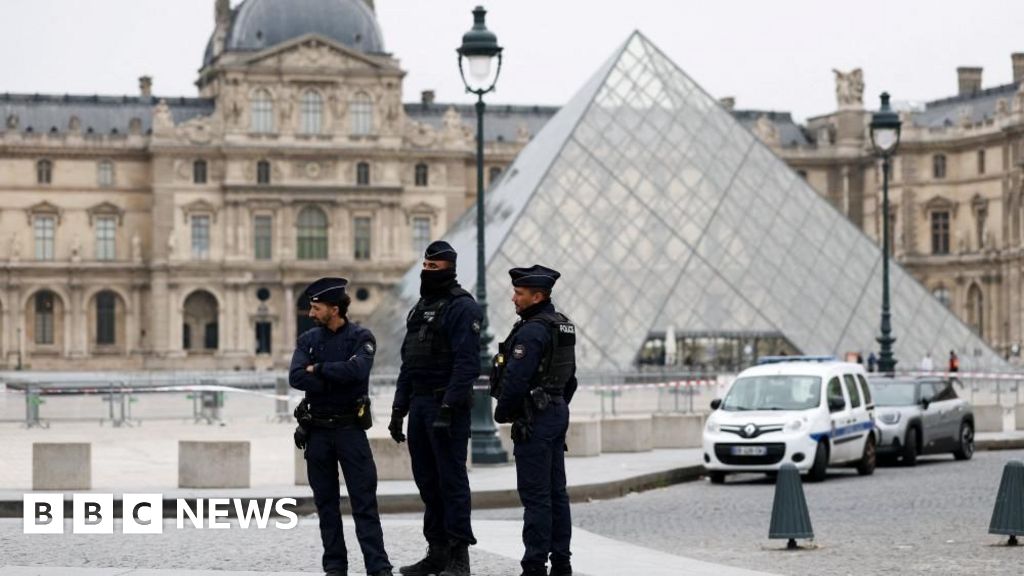The Louvre Museum in Paris has been forced to close while police investigate a brazen heist which targeted France’s priceless crown jewels.
Thieves wielding power tools broke into the world’s most visited museum in broad daylight, before escaping on scooters with eight “priceless” items of jewellery.
Here is what we know about the crime which has stunned France.
 Getty Images
Getty ImagesHow did the theft unfold?
The theft occurred on Sunday between 09:30 and 09:40 local time, shortly after the museum opened to visitors.
Four thieves used a vehicle-mounted mechanical lift to gain access to the Galerie d’Apollon (Gallery of Apollo) via a balcony close to the River Seine.
Pictures from the scene showed a vehicle-mounted ladder leading up to a first-floor window.
Two of the thieves cut through glass panes with a battery-powered disc cutter and entered the museum.
They then threatened the guards, who evacuated the premises, and stole items from two glass display cases.
The museum’s alarms sounded correctly and museum staff followed protocol by contacting security forces and protecting visitors, the culture ministry said in a statement.
The gang had tried to set fire to their vehicle outside but were prevented by the intervention of a museum staff-member, it added.
Culture Minister Rachida Dati told French news outlet TF1 that footage of the theft showed the masked robbers entering “calmly” and smashing display cases containing the jewels.
No one was injured in the incident, with Dati saying there was “no violence, very professional”.
She described the thieves as seemingly being “experienced” with a well-prepared plan to flee on two scooters.
 Getty Images
Getty Images
Investigators are looking for four suspects and are studying CCTV footage from the escape route.
The whole raid happened “very, very fast”, Interior Minister Laurent Nuñez told France Inter radio, and was over in a handful of minutes.
One witness described scenes of “total panic” as the museum was evacuated. Later images showed entrances closed off with metal gates.
What was stolen
According to the authorities, eight items were taken, including diadems, necklaces, ear-rings and brooches. All are from the 19th century, and once belonged to French royalty.
France’s ministry of culture said the stolen items were:
- a tiara and brooch belonging to Empress Eugénie, wife of Napoleon III
- an emerald necklace and a pair of emerald earrings from Empress Marie Louise
- a tiara, necklace and single earring from the sapphire set that belonged to Queen Marie-Amelie and Queen Hortense
- a brooch known as the “reliquary brooch”
Between them, these pieces are adorned with thousands of diamonds and other precious gemstones.
Two more items, including Empress Eugénie’s crown, were found near the scene, apparently having been dropped during the escape. The authorities are examining them for damage.
Nuñez described the stolen jewels “priceless” and “of immeasurable heritage value”.
 Bloomberg via Getty Images
Bloomberg via Getty Images Gamma-Rapho via Getty Images
Gamma-Rapho via Getty ImagesHave similar thefts happened before?
In 1911, an Italian museum employee was able to make off with the Mona Lisa under his coat after lifting the painting – which was then little-known to the public – straight off the wall of a quiet gallery.
It was recovered after two years and the culprit later said he was motivated by the belief the Leonardo da Vinci masterpiece belonged in Italy.
Fewer chances are taken with the Mona Lisa these days: the painting, perhaps the most renowned in the museum’s collection, hangs in a high-security glass compartment.
In 1998, the Le Chemin de Sevres – a 19th century painting by Camille Corot – was stolen and has never been found. The incident prompted a massive overhaul of museum security.
There has been a recent spate of thefts targeting French museums.
Last month, thieves broke into the Adrien Dubouche Museum in Limoges and stole porcelain works reputedly worth €9.5m ($11m / £8.25m).
In November 2024, seven items of “great historic and heritage value” were stolen from the Cognacq-Jay Museum in the capital. Five were recovered a few days ago.
The same month, armed robbers raided the Hieron Museum in Burgundy, firing shots before escaping with millions of pounds worth of 20th century artworks.
















Leave a Reply